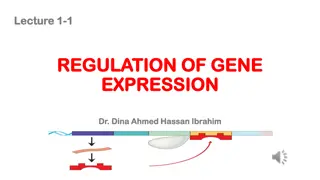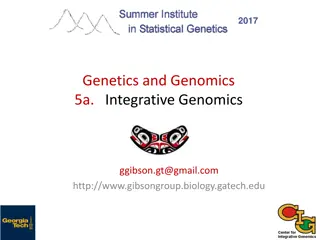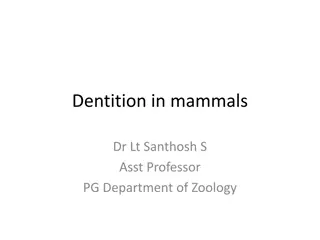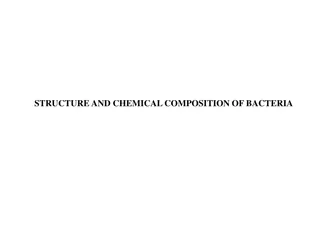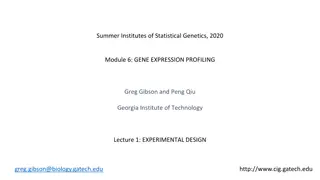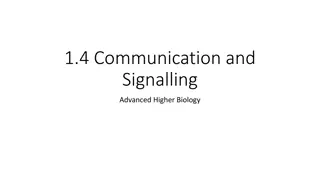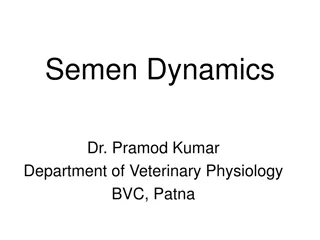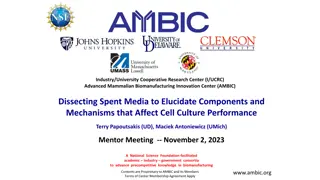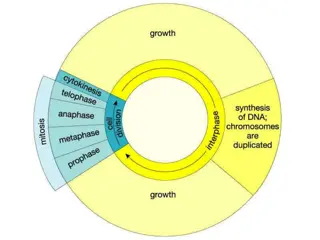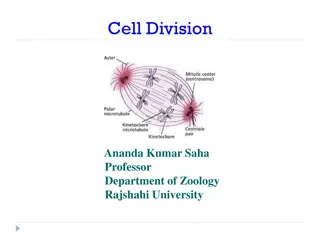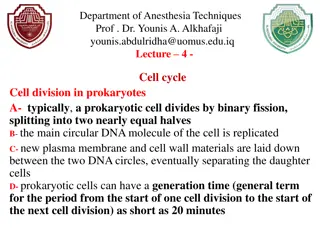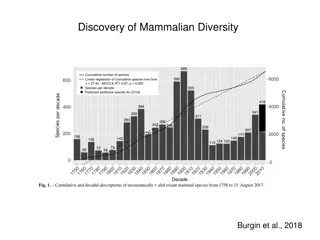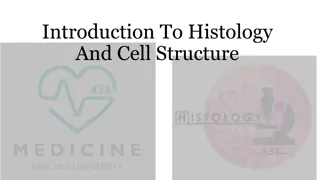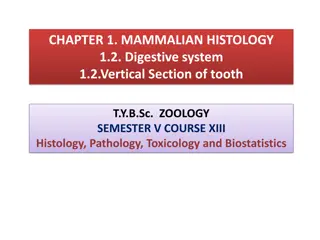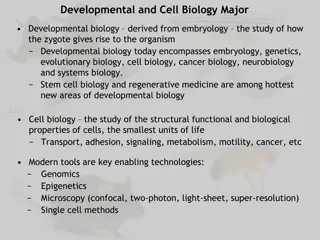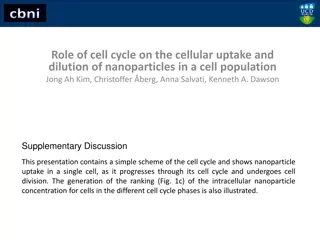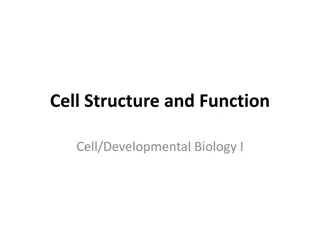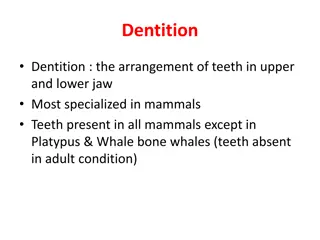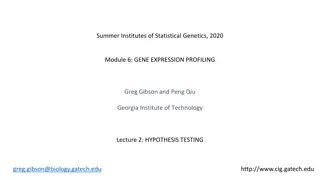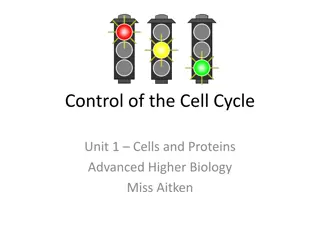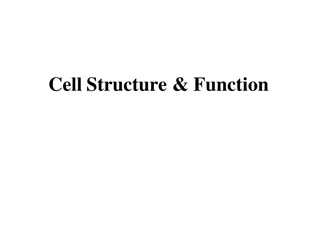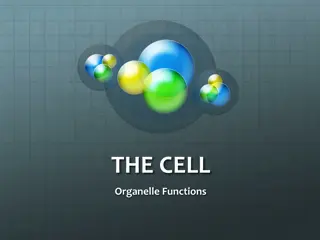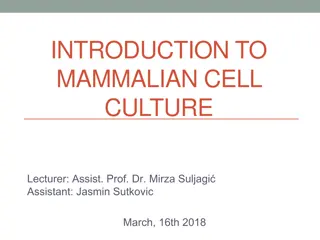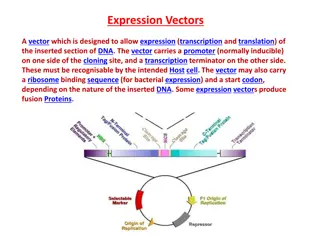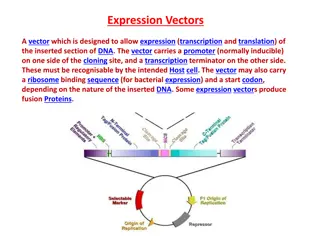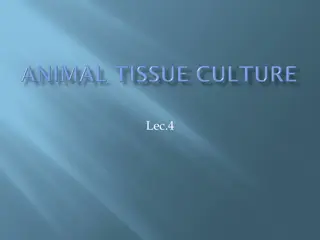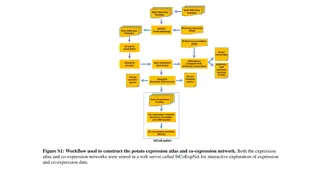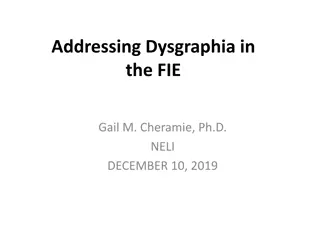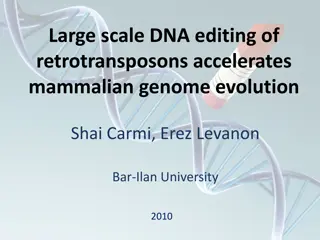Vi-CELL.BLU - Advanced Cell Counting Instrument
Vi-CELL.BLU is a cutting-edge cell counting instrument that offers faster analysis, increased resolution, and improved optical sensor technology for enhanced cell concentration and viability assessments. The device features a user-friendly interface, Trypan blue method for live cell detection, and a
1 views • 19 slides
Understanding Cell Viability Assays in Laboratory Testing
Cell viability assays play a crucial role in determining the health and status of cells, measuring their ability to survive and proliferate. These assays involve various techniques such as dye exclusion, colorimetric, fluorometric, luminometric, and flow cytometric assays. By assessing factors like
6 views • 16 slides
Understanding Gene Expression Regulation in Prokaryotes and Eukaryotes
Gene expression is a crucial process that leads to the production of functional gene products like RNA and proteins. This article explores the regulation of gene expression in both prokaryotes and eukaryotes, covering the importance of regulating gene expression, types of regulation elements, specif
5 views • 22 slides
Protein Expression Market
Protein Expression Market by System (Mammalian [CHO, HEK 293], Non-mammalian [Bacterial, Insect, Yeast]), Offering (Kits & Reagents, Vectors, Competent Cells, Services), Application (Industrial, Therapeutic, Research), and End User - Global Forecast to 2030\n\n
4 views • 4 slides
Exploring Genetics and Genomics in Integrative Biology
Delve into the world of genetics and genomics through the lens of integrative biology, investigating the differences between cell types, the rationale for gene expression profiling, and the analysis of differential gene expression in various diseases. Uncover the significance of gene ontology, co-ex
0 views • 22 slides
Mammalian Dentition and Tooth Structure Exploration
Understanding dentition in mammals sheds light on their evolution, classification, age approximation, and dietary habits. The arrangement of teeth, tooth structure, development, and types of mammalian teeth are discussed, highlighting unique features like thecodont attachment, enamel coating, and de
2 views • 16 slides
Bacterial Cell Structure and Composition Overview
Bacterial cells exhibit variations in size, typically ranging from 0.75 to 1.5 micrometers. The cell envelope, comprising glycocalyx, cell wall, and cell membrane, plays crucial roles in protection and cell function. The cell membrane, a thin barrier rich in phospholipids and proteins, is integral t
1 views • 28 slides
Overview of Cell Culture Methods and Importance in Research
Introduction to the principles of cell culture, including tissue culture, organ culture, and cell culture methods. Discusses the advantages and disadvantages of each technique and highlights the need for cell culture in research for studying cellular behavior and large-scale production of cell mater
3 views • 45 slides
Gene Expression Profiling in Statistical Genetics Summer Institute 2020
This content provides information on the Summer Institutes of Statistical Genetics module, focusing on gene expression profiling. It includes details on the schedule, experimental design, RNA sequencing workflow, modes of bulk RNA sequencing, and RNASeq software. The content discusses crucial steps
0 views • 11 slides
Cell Communication and Signalling in Biology
Cells communicate through extracellular signalling molecules that bind to specific receptors on target cells, leading to changes in cellular behavior. Hormones such as steroid and peptide hormones, neurotransmitters like nor-adrenaline and acetylcholine, play crucial roles in cell signaling. Recepto
0 views • 25 slides
Understanding Semen Dynamics and Capacitation in Mammalian Spermatozoa
Semen dynamics play a crucial role in mammalian reproduction, with capacitation being a key process for sperm fertilization capability. Capacitation involves physiological changes in sperm, leading to the acrosome reaction, crucial for oocyte penetration. As sperm transit through the epididymis, the
5 views • 13 slides
Advancements in Cell Culture Performance Optimization Through Dissecting Spent Media
The Industry/University Cooperative Research Center (I/UCRC) Advanced Mammalian Biomanufacturing Innovation Center (AMBIC) is focusing on dissecting spent media to understand the components affecting cell culture performance. The project aims to identify growth-promoting and inhibiting factors in sp
0 views • 16 slides
Regulation of the Cell Cycle: A Comprehensive Overview
Variation in cell cycle length in humans, controlled by internal and external mechanisms, with special proteins and checkpoint systems ensuring proper progression. External events trigger initiation and inhibition of cell division, while internal checkpoints maintain genetic integrity and chromosome
4 views • 14 slides
Understanding Gene Expression in Biological Sciences Course
Explore the dynamic world of gene expression with the Chunky and Chips Gene Expression Group at the University of Notre Dame. Dive into topics like transcription, translation, and cellular events influencing gene expression. Delve into real-world scenarios and gain insights into the cellular level b
0 views • 20 slides
Expression Tree Construction: Building Fully Parenthesized Expression Trees
In the process of building expression trees, nodes are inserted based on operators and operands, creating a fully parenthesized expression. The construction involves parsing the expression, inserting new nodes as tokens are examined, and linking nodes accordingly. By following the steps for handling
0 views • 17 slides
Exploring the Mammalian Diving Reflex
Delve into the fascinating adaptation of the mammalian diving reflex, where heart rate decreases when submerged in cold water to conserve body heat. Understand the evolutionary history, theory, and physiological changes involved in this reflex through an engaging experiment. Discover the sensations
0 views • 20 slides
Understanding the Cell Cycle and Mitosis Process
The cell cycle consists of two main periods: Interphase and Mitosis. During Interphase, the cell prepares for division by growing in size and copying chromosomes. Mitosis, the division of the nucleus, results in the formation of two daughter cells with identical chromosome copies. Centrioles and cen
0 views • 26 slides
Understanding Cell Division: Processes and Types
Cell division is a vital process in living cells for growth and reproduction. This article explores the basics of cell division, including the cell cycle, types of cell division (such as mitosis and meiosis), and the initiation of cell division. It also covers key phases like interphase and provides
0 views • 20 slides
Overview of Cell Division in Prokaryotes and Eukaryotic Cells
Cell division plays a crucial role in the growth and reproduction of all organisms. In prokaryotic cells, binary fission is the primary mode of division, while eukaryotic cells undergo a more complex process involving cell growth, DNA replication, chromosome distribution, and cytokinesis. The cell c
0 views • 10 slides
Fascinating Discoveries in Mammalian Diversity
Recent scientific findings have unveiled new species of mammals like the gymure Podogymnura intermedia in the Philippines and chipmunks Tamias cratericus and T. grisescens. Notably, the discovery of Rice's whale highlights the critical condition of this species. The evolution and varied characterist
0 views • 28 slides
Understanding Histology and Cell Structure Fundamentals
Delve into the intriguing world of histology and cell structure, exploring the composition of cells, the functions of various components like the nucleus and cytoplasm, and the significance of organelles. Discover how histology is studied, the types of microscopes used, and the vital role of the cel
0 views • 24 slides
Mammalian Tooth Structure: Vertical Section Overview
Mammalian teeth consist of hard tissues (enamel, dentine, cementum) and soft tissue (tooth pulp). The enamel is the hardest, dentine surrounds the pulp cavity, and cementum covers the dentine and connects to the alveolar bone. Tooth pulp provides support, nourishment, and defense mechanisms. Support
1 views • 7 slides
Explore the World of Developmental and Cell Biology
Developmental biology, stemming from embryology, investigates how organisms evolve from a zygote. It merges various fields like genetics, cell biology, and cancer biology. Cell biology focuses on cell properties and behaviors, using tools like genomics and microscopy. Research areas include cancer c
0 views • 8 slides
Role of Cell Cycle in Nanoparticle Uptake and Dilution in Cell Population
The cell cycle plays a crucial role in the cellular uptake and dilution of nanoparticles within a cell population. This process involves different phases such as G1, S, G2, and M, each with specific functions related to cell growth, DNA synthesis, protein synthesis, and cell division. Understanding
0 views • 20 slides
Understanding the Mammalian Diving Reflex
Explore the mammalian diving reflex, a fascinating adaptation seen in marine mammals and humans when submerged in cold water. This reflex involves a decrease in heart rate to conserve body heat, allowing for extended breath-holding. Through experiments, learn how the body reacts to underwater condit
0 views • 21 slides
Program to Convert Infix Expression to Postfix Expression
This program converts an infix expression to a postfix expression. It assumes there are five operators (*, /, +, -, ^) in the infix expression and operands are single digits only. The program does not handle invalid expressions or fractions. The provided code snippet contains functions for stack ope
0 views • 9 slides
Exploring Cell Structure and Function in Developmental Biology
Discover the intricate world of cell structure and function in the context of developmental biology. Delve into the inner workings of organelles, their functions, and how they contribute to cellular activities. Engage in interactive activities like building cell models and playing Cell Detective to
0 views • 14 slides
Mammalian Dentition and Tooth Structure
Dentition refers to the arrangement of teeth in the upper and lower jaw of mammals. Most mammals have specialized teeth, with some exceptions like the Platypus and Baleen whales. The structure of a mammalian tooth includes the crown, root, and neck, made up of dentine, enamel, and cement. Tooth deve
0 views • 13 slides
Basics of Hypothesis Testing in Gene Expression Profiling
The lecture covers the essential aspects of hypothesis testing in gene expression profiling, emphasizing experimental design, confounding factors, normalization of samples, linear modeling, gene-level contrasts, t-tests, ANOVA, and significance assessment techniques. Practical insights are shared on
0 views • 9 slides
Understanding Cell Cycle Control in Biology
Maintaining control of the cell cycle is crucial to producing healthy daughter cells and preventing mutations that can lead to degenerative diseases like Parkinson's or cancer. Cell cycle checkpoints at G1, G2, and Metaphase ensure the cell meets specific requirements before progressing to the next
0 views • 11 slides
Understanding Cell Structure and Function
Explore the intricate world of cell biology through this comprehensive guide covering the definition of a cell, the characteristics of animal cells, the role of the nucleus, ribosomes, cell structure, organelles, cell membrane, and cell wall. Discover the fascinating details of eukaryotic cells and
0 views • 61 slides
Understanding the Functions of Cell Organelles
Explore the vital functions of different cell organelles such as the cell membrane, nucleus, endoplasmic reticulum, lysosomes, Golgi apparatus, mitochondria, cytoplasm, ribosomes, vacuole, cell wall, chloroplasts, and chlorophyll in a cell. Learn how each organelle plays a unique role in maintaining
0 views • 38 slides
Basics of Mammalian Cell Culture
Mammalian cell culture involves the removal of cells from an organism for growth in a controlled environment. Primary cell cultures can be sub-cultured, leading to the generation of cell lines. Sub-culturing involves transferring cells to fresh growth media for further growth. Different methods and
0 views • 29 slides
Understanding Expression Vectors in Molecular Biology
Expression vectors are essential tools for gene expression studies, allowing for transcription and translation of specific DNA sections in host cells. These vectors contain key elements like promoters, terminators, and ribosome binding sequences for efficient protein production. Different promoters
0 views • 15 slides
Understanding Expression Vectors for Efficient Gene Expression
Expression vectors are designed to facilitate gene expression by carrying essential elements such as promoters, terminators, and fusion tags. They allow precise control over gene regulation for transcription and translation in host cells, enabling efficient protein production. Different promoters li
0 views • 15 slides
Understanding the Role of Multiple Enhancers in Gene Regulation
Multiple enhancers play a crucial role in regulating gene expression in a cell, with approximately 3-5 enhancers associated per human gene. These enhancers are essential for tissue-specific expressions and are active within the same cell line. The use of multiple enhancers can impact gene expression
0 views • 30 slides
Understanding Animal Tissue Culture and Cell Line Production
Animal tissue culture involves growing tissues separate from the animal in a laboratory setting. To achieve exponential cell growth, cells are converted into immortal cell lines. The production of a cell line involves steps like breaking cell adhesion, incubation, and transferring cells to fresh med
0 views • 22 slides
Insights into Potato Gene Expression and Co-Expression Networks
Explore the construction of the potato expression atlas and co-expression network through a detailed workflow. Visualize data on gene expression, up-regulated genes, power law distribution, and co-expression clusters. Interactive exploration available on the StCoExpNet web server.
0 views • 7 slides
Understanding Dysgraphia and Addressing Written Expression Challenges
Dysgraphia, a neurodevelopmental disorder, affects handwriting and language skills, leading to illegible and inefficient writing. Proper assessment methods and testing are necessary to address dysgraphia within the framework of specific learning disabilities. Components of written expression, cognit
0 views • 30 slides
DNA Editing of Retrotransposons and Mammalian Genome Evolution
Large-scale DNA editing of retrotransposons plays a crucial role in accelerating mammalian genome evolution. Retrotransposons, accounting for half of the human genome, are mobile elements that can lead to mutations and genetic disorders but also serve as a reservoir for genetic innovation, rewiring
0 views • 26 slides


